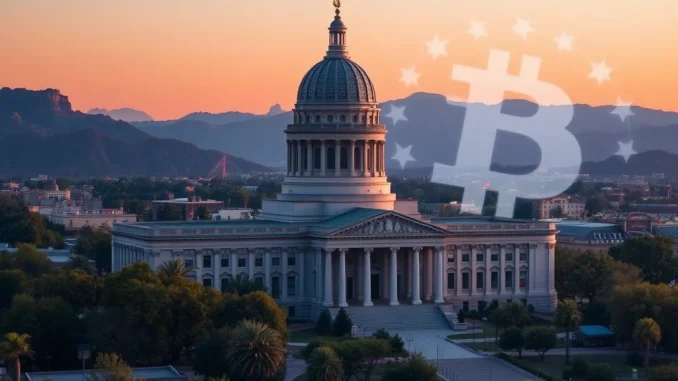
Attention crypto enthusiasts! Big news is brewing in the Grand Canyon State. The proposed Arizona Bitcoin bill, officially known as HB2324, has successfully navigated a crucial stage in the legislative process, bringing the state closer to potentially establishing a novel approach to managing seized assets.
Understanding HB2324 Arizona’s Proposal
The core of this legislative effort, HB2324 Arizona, revolves around the creation of a specific reserve. This isn’t just any reserve; it’s designed to hold assets acquired through criminal asset forfeiture. What makes this bill particularly noteworthy in the cryptocurrency world is its explicit inclusion of Bitcoin as an asset that could be directed into this state-managed reserve.
Here’s a quick breakdown of what we know so far:
- The bill, HB2324, was passed by the Arizona House of Representatives.
- Its primary function is to establish a reserve for assets seized through criminal forfeiture.
- Significantly, it proposes that Bitcoin could be one of the assets held in this reserve.
- The bill’s current status is awaiting the signature of the state governor.
This development signals a growing consideration among state lawmakers regarding how digital assets like Bitcoin should be handled within existing legal and financial frameworks, particularly concerning law enforcement activities and asset recovery.
The Potential for a State Bitcoin Reserve
If signed into law, HB2324 would pave the way for Arizona to potentially hold Bitcoin as part of its official state reserves derived from seized assets. This concept of a Bitcoin reserve funded through forfeiture is relatively new territory for US states. While states have procedures for handling seized traditional assets, formal mechanisms for managing and potentially holding seized cryptocurrencies are still evolving.
Establishing such a reserve raises interesting questions about asset management, security, and the state’s direct interaction with volatile digital currencies. It reflects an acknowledgment of Bitcoin’s increasing presence, not only in legitimate finance but also unfortunately in illicit activities, necessitating clear legal procedures for its handling when seized.
Implications for Arizona Crypto Law and Beyond
The passage of HB2324 through the House is a significant step for Arizona crypto law. It indicates a willingness by the state legislature to address digital assets directly within statutory language. This isn’t the first time Arizona has considered legislation touching upon cryptocurrencies, but a bill focused on incorporating Bitcoin into state asset management procedures is a notable progression.
Furthermore, this bill could set a precedent or contribute to a broader trend among other jurisdictions. As states grapple with how to regulate, tax, and manage digital assets, Arizona’s approach to a forfeiture-based Bitcoin reserve will likely be watched closely. It adds another dimension to the developing landscape of US state Bitcoin and cryptocurrency legislation.
What Happens Next?
The fate of HB2324 now rests with the Arizona state governor. Awaiting the governor’s final signature is the critical next step. If approved, it would become law, making it the state’s second reserve-related bill concerning assets from criminal forfeiture, but the first specifically incorporating Bitcoin in this manner. The decision will be pivotal in determining Arizona’s immediate future regarding state-held digital assets.
Conclusion: A Step Towards State-Level Bitcoin Integration?
Arizona’s HB2324 passing the House marks a noteworthy moment in the intersection of state law and digital assets. The prospect of a state-managed Bitcoin reserve, funded by seized criminal assets, highlights the increasing need for governments to establish clear protocols for handling cryptocurrencies. Whether the governor signs the bill will determine if Arizona takes this specific step into holding Bitcoin, potentially influencing the trajectory of US state Bitcoin adoption and asset management policies in the future. This development is certainly one to keep an eye on for anyone interested in how traditional legal systems are adapting to the age of digital currency.



